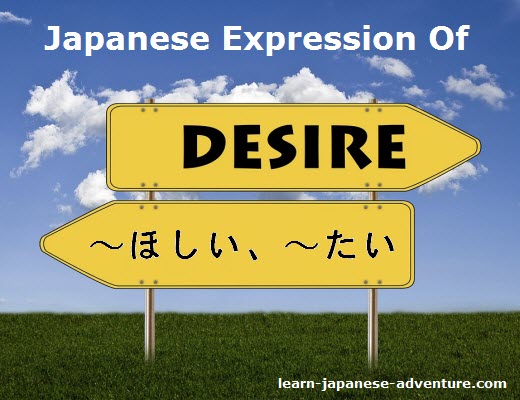Japanese Expression of Desire-Learn Japanese Online Intermediate Lessons:1
この最初の中級レッスンでは、何かに対する欲求(名詞)と何かをしたいという欲求(動詞)の日本語表現を学びます。

あなたが望むか、何かをしたいとき(名詞)、使用される表現は”新しい”または”新しい”(hoshii)です。
何かをしたい、またはしたいとき(動詞-それは行動なので)、日本語の表現”動詞{枡形の幹}たい”(tai)が使用されます。
これら二つの表現には、第三者の欲望を記述するときなど、他にもいくつかのバリエーションと機能がありますが、このレッスンではそれらの基本的な機能に焦点を当てます。
今後のレッスンでは他の機能について説明します。
何かに対する欲求の日本語表現
最初の表現の文型を見てみましょう。..
(私は)Nounがほしいです
(watashi wa)Noun ga hoshii desu
この表現は一人称のみに使用されるので、常に”私は名詞が星井です”です。 しかし、”私は”は、スピーカーが最初の人として話していることが明らかであるため、通常は省略されています。
したがって、次の文は話者の欲望ではないので間違っている。..
- 田中さんは犬 が ほしいです。 X
田中さんは犬が星ですX
意味:田中さんは犬が欲しいです。 X
ノート: この文章は、田中さんの欲求
だから間違っていますが、質問で誰か(二人目)に自分の欲求を尋ねることができます。 したがって、次のような質問でこの式を使用できます。..
- あなたは何 が ほしいですか。
あなたは何が欲しいですか
意味:あなたは何が欲しいですか?
この表現では、あなたが望むもの(名詞)は、粒子が(ga)でマークされています。 これはあなたが覚えておく必要があるルールです。
オブジェクト名詞のために、それはa)もの、b)人とc)時間にすることができます。 Let’s use some examples to further see how this Japanese expression works…
a) Thing
- 今日はとても暑いです。私は冷たいジュース が ほしいです。
kyou wa totemo atsui desu. watashi wa tsumetai ju-su ga hoshii desu
Meaning: Today is very hot. I want cold juice.
- 今日は雨が降っています。傘 が ほしいです。
kyou wa ame ga futte imasu. kasa ga hoshii desu
Meaning: Today is raining. I want an umbrella.
b) People
- 私は恋人 が ほしいです。
watashi wa koibito ga hoshii desu
Meaning: I want a boyfriend/girlfriend.
- 私は日本人の友達 が ほしいです。
watashi wa nihonjin no tomodachi ga hoshii desu
Meaning: I want a Japanese friend.
c) Time
- 私はとても忙しいから、時間 が ほしいです。
watashi wa totemo isogashii kara, jikan ga hoshii desu
Meaning: I want time because I am so busy.
Negative and Past Tense of ほしい (hoshii)
As ほしい (hoshii) is an i-adjective, the negative form and past tense (affirmative and negative) follow how an i-adjective changes form. Take a look at the following…
| Present Affirmative: | ほしいです |
| Present Negative: | ほしくないです |
| Past Affirmative: | ほしかったです |
| Past Negative: | ほしくなかったです |
Let’s make some examples to explain the various forms clearly…
- 子供の時人形 が ほしかったですが、今はほしくないです。
kodomo no toki ningyou ga hoshikatta desu ga, ima wa hoshikunai desu
Meaning: I wanted a doll when I was a kid, but I don’t want it anymore now.
- 五年前にカメラ が ほしくなかったですが、今はほしいです。
gonen mae ni kamera ga hoshikunakatta desu ga, ima wa hoshii desu
Meaning: 私は5年前にカメラを望んでいませんでしたが、私は今それをしたいです。
心に留めておいてください日本語の表現”ほしい”は、物/物にのみ使用されます。 何か(行動)をしたいという欲求があるときには使えません。
よくある間違いは次の文です。..
- 私は寝ます が ほしいです。 X
私は寝ますが星ですX
意味:眠りたい。 X
注:nemasuは動詞であるため、この文は間違っています。
注: 実際には動詞を新しい(hoshii)に接続することができますが、動詞を最初にして-form(te-form)に変更する必要があります:Verb(て-form)新しい。 しかし、動詞(て-form)新しいは、将来のレッスンの一つで議論される上記とは異なる意味を持っています。 ただ、あなたがに直接接続することはできませんことに注意してください動詞をしい(hoshii)あなたがそれを変更しない限り、それは-form(te-form)。
自分の何かをしたいという欲求(行動)のためには、次の日本の何かをしたいという欲求の表現を使用する必要があります。
何かをしたいという日本語の表現
この日本語の表現の文型を見てみましょう。..
動詞{マスの形の幹}たいです
動詞{マスの形の幹}タイです
あなたがそれを形成する方法がわからない場合は、masu-formの日本語動詞幹のページをチェックしてください。 いくつかの動詞を使って、それぞれのたい形(tai-form)に変更する方法を見てみましょう。..
| dict-form | masu-form | tai-form | Meaning | |
| 買う | 買います | 買いたい | want to buy | |
| 待つ | 待ちます | 待ちたい | want to wait | |
| 乗る | 乗ります | 乗りたい | want to ride | |
| 飲む | 飲みます | 飲みたい | want to drink | |
| 死ぬ | 死にます | 死にたい | want to die | |
| 遊ぶ | 遊びます | 遊びたい | want to play | |
| 行く | 行きます | 行きたい | want to go | |
| 泳ぐ | 泳ぎます | 泳ぎたい | want to swim | |
| 話す | 話します | 話したい | want to talk | |
| 見る | 見ます | 見たい | want to see | |
| する | します | したい | want to do | |
| くる | きます | きたい | want to come |
たい-form (tai-form) is also similar to ほしい (hoshii) that it is only used for first person. Therefore it’s wrong to say “someone (other than yourself) verb(~tai) desu”.
But it’s Ok to use it when asking someone “what he or she wants to do” in a question.
For たい (tai) sentence, you can still use the particles as per normal. However sometimes particle を (wo) is changed to が (ga).
It’s Ok to use either of them, but most of the time が (ga) is used. Let’s check out some examples for this Japanese expression…
- ジュース を/が 飲みたいです。
ju-su wo/ga nomitai desu
Meaning: I want to drink juice.
- 本屋 へ 行きたいです。
honya e ikitai desu
Meaning: I want to go to the bookstore.
- 電車 に 乗りたいです。
densha ni noritai desu
Meaning: I want to get on the train.
- 日本語の新聞 を/が 読みたいです。
nihongo no shinbun wo/ga yomitai desu
Meaning: I want to read Japanese newspaper.
Negative and Past Tense of Verb たい (tai) form
Similar to ほしい (hoshii), verb tai-form is also an i-adjective. Therefore the same rule applies when changing form to negative and past tense.
Please see the following for a clearer picture…
| Present Affirmative: | ~たいです |
| Present Negative: | ~たくないです |
| Past Affirmative: | ~たかったです |
| Past Negative: | ~たくなかったです |
Let’s make some similar examples as you have done in the other Japanese expression “hoshii” to explain the various forms clearly…
- 今朝はビール が 飲みたくなかったですが、今は飲みたいです。
kesa wa bi-ru ga nomitakunakatta desu ga, ima wa nomitai desu
Meaning: I didn’t want to drink beer this morning, but I want to drink now.
- 子供の時は公園 で 遊びたかったですが、今は遊びたくないです。
kodomo no toki wa kouen de asobitakatta desu ga, ima wa asobitakunai desu
Meaning: I wanted to play at the park when I was a kid, but I don’t want to play now.
Dreaming of learning Japanese? Get 31% OFF Premium or Premium PLUS plan! Ends 26 March, 2021.
Click Here to Get 31% OFF Premium or Premium PLUS plan and be on the fast track to fluency in Japanese.
上記のリンクはアフィリエイトリンクであり、関連する学習コースを購入した場合、私は手数料を(あなたに追加費用なしで)獲得することを意味します。
次のレッスン2:日本語文法体験